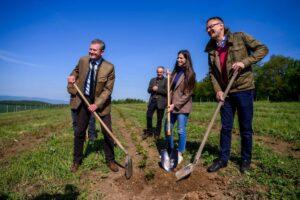This year, the “Forest of Newborns” will grow to 450 hectares
With the cooperation of the Ministry of Agriculture, the “Forest of Newborns” Program was launched in 2020, within the framework of which, according to the commitment made in the Climate and Nature Protection Action Plan, by 2030, ten or at least one million trees per year will be planted for every child born in Hungary.

(Photo: Csaba Pelsőczy)
The forest plantings were carried out within the framework of the National Afforestation Program of the Ministry of Agriculture, the success of which is indicated by the fact that Hungarian farmers applied for the planting of more than 50,000 hectares of new forest since its announcement.
Forests are being planted in an increasingly large area
Sándor Szentpéteri, head of the Forestry Development Policy and Innovation Department of the Ministry of Agriculture, highlighted at the presentation of the “Forest of Newborns” in Nógrád County that a total of 300 hectares of forest have been planted annually until 2022 within the framework of the Forest of Newborns Program. This year, the program will continue on an additional 150 hectares. He emphasized that the government is committed to the preservation of existing forests and the increase of wooded areas, so that forests can play an outstanding role in climate protection, natural resource protection, and biodiversity preservation. He also emphasized that natural values can be preserved with sustainable forest management, while more and more ecotourism functions can be developed for society. In recent years, the number of visitors to the forests has increased by an average of 25-30%, and in some areas it has even tripled.
Between 2020 and 2023, Ipoly Erdő Zrt. planted a new forest from native tree species on more than 89 hectares
After the newborns in the Pest County, he implemented forest planting on 22 hectares on the border of the villages of Kisnémedi, Rád and Tésa, and after the newborns in the Nógrád County on nearly 5 hectares. A total of 3,300 kg of tan and oak acorns and another 1,300 native rare mixed tree seedlings were used in the two counties. In the past 14 years, the state forestry has planted nearly 170 hectares of new forests, thereby mitigating the negative processes caused by climate change, and contributing to the achievement of the set goal, according to which the area covered by trees in the country will reach 27% by 2030.
The Ministry of Agriculture remains committed to both the thoughtful continuation of current programs and the exploration of new opportunities. The ministry has created and will continue to maintain the conditions for afforestation and long-term, sustainable forest management to be an attractive option for farmers in areas with lower productivity.
A.M
Related news
AM: the Szupermenta product test program provides additional information for purchase
The National Food Chain Safety Office (Nébih) Szupermenta product test…
Read more >From January 1, buyers must pay producers within 30 days
The 30-day payment deadline for agricultural and food products has…
Read more >Leaving the negative period behind
According to the data by IWSR, 2.57 million hectolitres of…
Read more >Related news
Recognition of Consumer Protection Excellence: Honoring the Best of 2024
This year’s outstanding consumer protection officers and special award recipients…
Read more >The Joy of Giving! – SPAR stores collect non-perishable food for people in need
The Hungarian Maltese Charity Service and SPAR Hungary have launched…
Read more >KSH: industrial production decreased by 0.2 percent in October
In October, the volume of industrial production fell by 0.2…
Read more >








